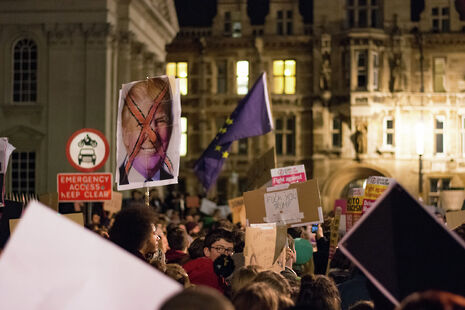Reclaiming national identity could be our greatest weapon
In light of Trump’s first week in office, Yukiko Lui argues that subverting the president’s idea of patriotism could be the best way forward

This week, like many others, I have felt as though the world is teetering on the edge of a cliff. Donald Trump’s ban on refugees from largely Muslim countries entering the United States has sent the globe into a tailspin. Stories of heartbreak, anger, and sadness have emerged – the kind of heartbreak, anger, and sadness even the most pessimistic of us had thought were bygones of a different, more brutal and divided world. In the midst of the cloud of fear that has settled over Muslim communities and their allies, I have tried to find some solace in the lessons of multiculturalism and hope, and the resilience of justice.
It seems appropriate to remember Martin Luther King Jr’s words about the arc of the moral universe. Campaigners for multiculturalism and social justice in general have made the world more equal than it has ever been before. And even if we have to dig deep for hope, we can find solace in the undeniable fact that the world is not the one which Donald Trump and Steve Bannon believe it to be. Their persistent refusal to acknowledge that borders and cultures are not as heavily drawn as they once were threatens to put societies out of touch with reality. Their invocation of what they perceive to be a bigoted, isolationist American identity is unsubstantiated. We are increasingly interconnected and intermixed, and lazy fear-mongering and the affirmation of a fictional ‘great’ national identity will do nothing to change that. Protests and resistance around the world have shown that the bonds of whatever self-interested national mindset President Trump ascribes to the American population reveal more about him than they do about reality.
“Perhaps now is the time for progressives to resist and reclaim the discourse of patriotism.”
Somehow a fervent nationalism has sprung up on the sleeping liberal world. Far-right politicians invoke national identity to decry the ills of multiculturalism and everywhere we see the seeds of bigotry sprouting up into the sunlight. In liberal circles, patriotism, nationalism and flag-waving, anthem-singing fervour are hushed away. They are trapdoors to fascism and xenophobia, rather than a force for good. Liberals have long-neglected national identity as a rhetorical tool, choosing instead to call on the values of hope, justice, and equality. But, as we have seen in the almost universal outrage directed towards Donald Trump’s Muslim ban, those values are inextricable from American national identity – in fact, they are part and parcel of human nature. Perhaps now is the time for progressives to resist and reclaim the discourse of patriotism.
The slow reclamation of national identity as a political tool by liberals and progressives was most recently seen in the run-up to last year’s American election: it was said that the racism, sexism, and general bigotry of one campaign didn’t fit with the ethos and creed of their country. But the need for this reclamation is more urgent now than before, and it has been shown that such an attempt can be efficacious. When I think of national identities used for the progressive good, Lin-Manuel Miranda’s musical Hamilton comes to mind. With the story of Alexander Hamilton, Miranda extends the warm threads of national identity to those who are often left out in the cold. It shuns the overwhelming feeling in the world that there is one ‘right’ way to be American, British, French or Chinese. Yes, George Washington was a white slave-owner. Yes, he can be played by a black man. It is the ultimate recognition not only that the world has changed, but that it has brought our idea of history along with it, too, hurtling towards plurality. By casting actors of colour in roles previously reserved for white performers, Miranda tells us that the American national identity has changed. Patriotism in Hamilton is not viewed as a scourge on decent politics. Instead, it is presented as a message of inclusion and acceptance, that no matter your race or religion you can participate in this exercise of progressive patriotism.
Liberal populations have long trudged on, heads down, in the hope that one day the world will be a better place, but the shock of far right-campaigns in Europe and in North America have spurred us into action. Donald Trump has tried to tell Americans what it means to be American: racist, Islamophobic, and white. But the actions and words of so many Americans, and defiant works like Hamilton, have underscored that his claims are groundless and false. Holding those values of decency and goodness which are no doubt embedded in the majority of Americans to heart, we should push to reclaim our national identities from those who wish to see it used to divide and demean. A new look at patriotism and national identity might be just what we need. The rhetoric of a strong national identity is the far-right politician’s greatest weapon, and we can take it away
 Comment / Anti-trans societies won’t make women safer14 November 2025
Comment / Anti-trans societies won’t make women safer14 November 2025 Fashion / You smell really boring 13 November 2025
Fashion / You smell really boring 13 November 2025 Features / Beyond the Pitt Club: The Cambridge secret societies you have never heard of16 November 2025
Features / Beyond the Pitt Club: The Cambridge secret societies you have never heard of16 November 2025 News / Pembroke flood damage forces ‘costly’ repairs17 November 2025
News / Pembroke flood damage forces ‘costly’ repairs17 November 2025 News / University opens new sports pitch15 November 2025
News / University opens new sports pitch15 November 2025









